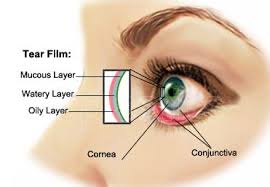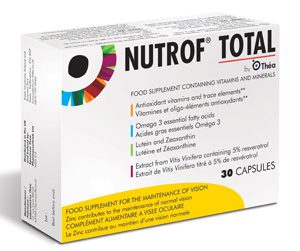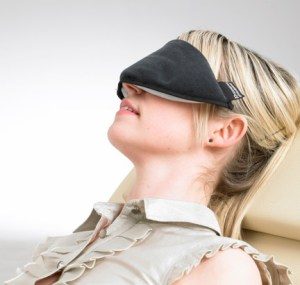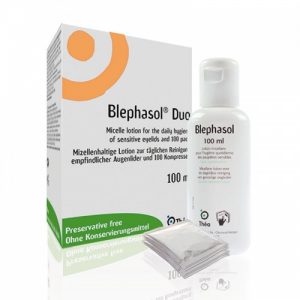 Dry eye affects at least 1 in 5 adults and is more common in women than men. It may occur as a result of insufficient tears production but more commonly is related to poor tears quality.
Dry eye affects at least 1 in 5 adults and is more common in women than men. It may occur as a result of insufficient tears production but more commonly is related to poor tears quality.
In 80% of cases, evaporative dry eye is the root cause of the symptoms. The tears film is refreshed with every blink, providing lubrication, protection and clarity of vision. It is composed of 3 layers. The superficial oily layer discourages evaporation and stabilises the tears film.
The middle watery layer is an aqueous layer which has antibacterial properties and helps flush away debris every time we blink. The third layer nearest the cornea is a sticky mucus layer that holds the tears onto the surface of the eye. In evaporative dry eye the oil glands in the upper and lower eye lids do not secrete efficiently, a condition is called Meibomian gland dysfunction.
Symptoms of dry eyes may include:
- Gritty feeling
- Burning, stinging sensation
- Intermittently blurred or smeary vision
- Tired eye feeling
- Watery eyes
- Frequent forced blinking
- Sensitivity to pollution and air conditioning
What causes dry eyes?
- Meibomian Gland Dysfunction
- Blepharitis (inflammation of the eyelids)
- Computer use (decreased blink frequency)
- Laser eye surgery
- Hormonal changes (menopause)
- Being dehydrated
- Pollution or dry environments
- Some medications for conditions such as high blood pressure, hayfever, contraception, and depression. CAUTION: do not alter or adjust your prescribed medicines without instructions from your doctor.
What is the treatment for dry eyes?
 Environmental factors such as air conditioning, pollen and air pollution should be considered as contributory factors in dry eye.
Environmental factors such as air conditioning, pollen and air pollution should be considered as contributory factors in dry eye.
Ensure that you take breaks from the computer, remember to blink and avoid staring when concentrating on a task and wear sunglasses in bright and windy conditions. Wrap around sunglasses that enclose the eyes are particularly helpful in dry eye, as well as allergic eye conditions such as Hayfever.
Making sure your diet is rich in Omega 3 essential fatty acids which have been shown to reduce symptoms. These can be found in oily fish such as salmon, sardines, mackerel. Alternatively, dietary supplements are available such as Nutrof capsules.
A common cause of dry eye is Blepharitis. In this instance warm compresses, eyelid massage and an eyelid cleansing regime is required. For this we recommend, an eyebag and the blepha-range of products which we have in store. We can advise and demonstrate how to use these products effectively.


For most types of dry eye, lubricating eye drops can be used to alleviate symptoms. The modern dry eye drops, lubricate and hydrate the surface of the eye. Some are also available in gel form for longer lasting relief, particularly overnight. We advise eye drops and gels that are free from all preservatives. All of our dry eye products in store meet this recommendation.
If you feel you may have a dry eye problem, mention this at your eye examination and one of our optometrists would be very happy to discuss treatment options.